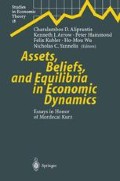Summary
This paper studies how communication or exchange of opinions influences correlation of beliefs. The paper focuses on a situation in which agents communicate with each other infinitely many times without observing data. It is an extension to the ‘Expert Problem’ in Bayesian theory, where the informational flow is asymmetric. Moreover, this paper generalizes the existing literature of communication that employs the common prior assumption (CPA) by allowing for heterogeneous beliefs. Some basic convergence results are shown in contrast with the results obtained under the CPA. Furthermore, several economic implications of the basic results are provided.
The results presented in this paper are taken from my Ph.D. thesis at Stanford University. I gratefully acknowledge the inspiration obtained from innumerable discussions with Mordecai Kurz about this subject. Also, I appreciate comments from Kenneth J. Arrow, Peter J. Hammond, Maurizio Motolese, Carsten K. Nielsen, Ho-Mou Wu and the anonymous referee.
Access this chapter
Tax calculation will be finalised at checkout
Purchases are for personal use only
Preview
Unable to display preview. Download preview PDF.
References
Ash, R. B.: Real analysis and probability. San Diego, CA: Academic Press 1972
Aumann, R.: Agreeing to Disagree. Annals of Statistics 4, 1236–1239 (1976)
Banerjee, A. V.: A simple model of herd behavior. Quarterly Journal of Economics 107, 797–817 (1992)
Bayarri, M. J., DeGroot, M.H.: What Bayesians expect of each other. Journal of the American Statistical Association 86, 924–932 (1991)
Berck, P., Sydsæter, K.: Economists’ mathematical manual, 2nd edn. Berlin Heidelberg New York: Springer 1993
Bikhchandani, S., Hirshleifer, D., Welch, I.: A theory of fads, fashion, custom, and cultural change as informational cascades. Journal of Political Economy 100, 992–1026 (1992)
Blackwell, D., Dubins, L.: A merging of opinions with increasing information. Annals of Mathematical Statistics 33, 882–886 (1962)
Brandenburger, A., Dekel, E.: Hierarchies of beliefs and common knowledge. Journal of Economic Theory 59, 189–198(1993)
Breiman, L.: Probability. Philadelphia, PA: Society for Industrial and Applied Mathematics 1992
Cont, R., Bouchard, J.P.: Herd behavior and aggregate fluctuations in financial markets. Macro-economic Dynamics 4, 170–196 (2000)
Dalkey, N. C, Helmer, 0.: An experimental application of the Delphi method to the use of experts. Management Science 9, 458–467 (1963)
Durlauf, S. N.: Nonergodic economic growth. Review of Economic Studies 60, 349–366 (1993)
Freedman, D.: On the asymptotic behavior of Bayes estimates in the discrete case II. Annals of Mathematical Statistics 36, 454–456 (1965)
French, S.: Updating of belief in the light of someone else’s opinion. Journal of the Royal Statistical Society, Series A 143, 43–48 (1980)
Geanakoplos, J. D., Polemarchakis, H. M.: We can’t disagree forever. Journal of Economic Theory 28, 192–200 (1982)
Genest, C, Schervish, M. J.: Modeling expert judgments for Bayesian updating. Annals of Statistics 13, 1198–1212(1985)
Gray, R. M.: Probability, random processes, and ergodic properties. New York, NY: Springer 1988
Halmos, P. R.: Measure theory. New York, NY: Springer 1974
Kolmogorov, A.N., Fomin, S.V.: Introductory real analysis (translated and edited by R. A. Silverman). Mineola, NY: Dover 1975 (cl970)
Kurz, M., Schneider, M.: Coordination and correlation in Markov rational belief equilibria. Economic Theory 8, 489–520 (1996)
Martino, J. P.: Technological forecasting for decision making, 2nd edn. New York, NY: North-Holland 1983
Nakata, H.: A model of financial markets with endogenously correlated rational beliefs. Ph.D. dissertation, Ch. 3. On the dynamics of endogenous correlations of beliefs. Stanford, CA: Stanford University 2001
Nielsen. L.T.: Common knowledge, communication, and convergence of beliefs. Mathematical Social Sciences 8, 1–14 (1984)
Orléan, A.: Bayesian interactions and collective dynamics of opinion: herd behavior and mimetic contagion. Journal of Economic Behavior and Organization 28, 257–274 (1995)
Osborne, M. J., Rubinstein, A.: A course in game theory. Cambridge, MA: The MIT Press 1994
Romer, P. M.: Increasing returns and long run growth. Journal of Political Economy 94, 1002–1037 (1986)
Rowe, G., Wright, G.: The Delphi technique as a forecasting tool: issues and analysis. International Journal of Forecasting 15, 353–375 (1999)
Royden, H. L.: Real analysis, 3rd edn. Englewood Cliffs, NJ: Prentice-Hall 1988
West, M.: Modelling agent forecast distribution. Journal of the Royal Statistical Society, Series B 54, 553–567 (1992)
West, M., Crosse, J.: Modelling probabilistic agent opinion. Journal of the Royal Statistical Society, Series B 54, 285–299 (1992)
Author information
Authors and Affiliations
Editor information
Editors and Affiliations
Rights and permissions
Copyright information
© 2004 Springer-Verlag Berlin Heidelberg
About this chapter
Cite this chapter
Nakata, H. (2004). Modelling exchange of probabilistic opinions. In: Aliprantis, C.D., Arrow, K.J., Hammond, P., Kubler, F., Wu, HM., Yannelis, N.C. (eds) Assets, Beliefs, and Equilibria in Economic Dynamics. Studies in Economic Theory, vol 18. Springer, Berlin, Heidelberg. https://doi.org/10.1007/978-3-662-05858-9_31
Download citation
DOI: https://doi.org/10.1007/978-3-662-05858-9_31
Publisher Name: Springer, Berlin, Heidelberg
Print ISBN: 978-3-642-05663-5
Online ISBN: 978-3-662-05858-9
eBook Packages: Springer Book Archive

